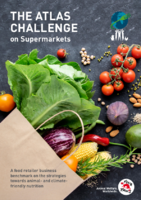
Supermarkets
Are leading food retailers prioritising meat reduction and increasing plant-based foods?
There are an estimated 80 billion farmed animals worldwide slaughtered for human consumption every year. Their lives are comprised of immense suffering, while the environment and our natural resources are at stake, too. Animal agriculture is one of the leading contributors to the world’s greenhouse gas emissions.
From animal suffering to climate change, global factory farming is destroying our planet!
Meat and dairy production causes significantly more emissions than plant-based foods.1 Whilst we are seeing more food retailers step up their game towards net zero goals, highlighting the link between climate and factory farming, as well as cutting ties with suppliers sourcing animal-derived products from factory farms, is lacking. Increasing plant-based offerings is a good start, but without clear animal protein reduction targets, they are just supermarkets selling more food and hiding behind offsetting other emissions.
FOUR PAWS conducted a ranking depicting the level of effort and performance of some of the leading food retailers in Austria, Germany, Switzerland and in the United Kingdom on their meat reduction strategies and on their sustainable nutrition initiatives.
As part of the research and analysis, FOUR PAWS sent a questionnaire to the selected food retailers for their input. Those who actively refused participation – Globus (DE), Marktkauf (DE), Penny (AT), Adeg (AT), MPreis (AT), Spar (CH), Denner (CH), Sainsbury's (UK) and Waitrose (UK) – as well as the non-respondents were thus evaluated solely by FOUR PAWS’ research on publicly available information online.
Are the supermarkets taking the necessary steps to reduce the amount of meat offered? Are they expanding their plant-based and innovative animal-free alternatives? See which supermarket is pulling their weight and how they compare to the rest.
* Abbreviation for United Kingdom (UK), Germany (DE), Austria (AT) + Switzerland (CH)
The Atlas Challenge ranking is based on FOUR PAWS' assessment. It provides an overview of selected supermarket chains' performance when it comes to progressive food strategies, which support meat reduction as well as the increase of plant-based and innovative animal-free substitutes. The reduction of animal-derived products and the availability of plant-based alternatives are key to help lower greenhouse gas emissions and the impact it has on our planet, as well as on the billions of farmed animals suffering in industrial keeping systems.
For more information, click here (revised in August 2022).
Did you know?
- Global greenhouse gas emissions from animal-based foods are twice those of plant-based foods.2
- Globally, we eat around 318 million tonnes of meat every year. By 2050, that figure is projected to reach 517 million tonnes.3
- 60% of global diversity loss is caused by the food system.4
- The European plant-based food sector has grown by 49% in 2 years.5
- One of the biggest causes of forest loss is the expansion of agricultural land for animal feed production such as soya.6
Source






































